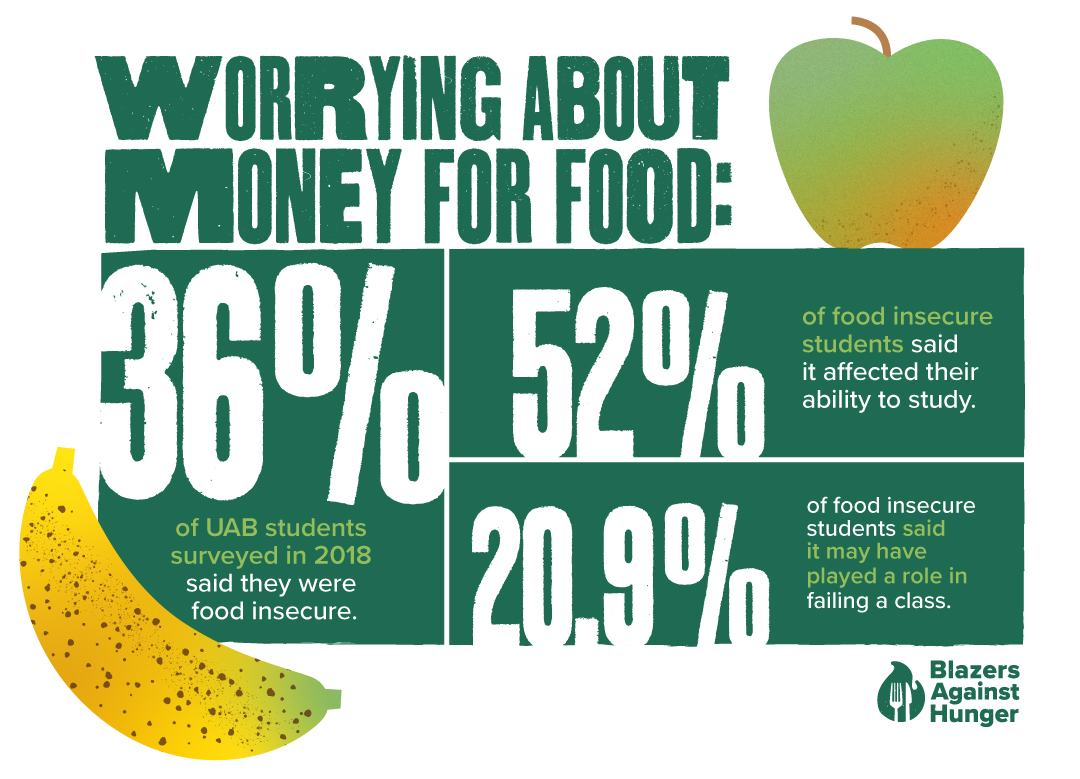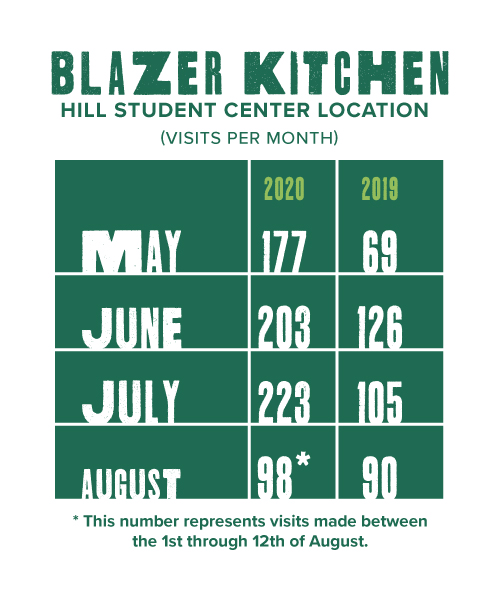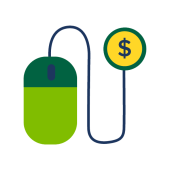More than one-third of UAB students said they were food insecure in a 2018 survey. Now, the COVID-19 pandemic has likely increased that number as the university's Blazers Against Hunger online giving event approaches.
By Brett Bralley
Food insecurity can set off a chain reaction.

Picture a UAB student. Whether she's sitting in a classroom or joining a lecture over Zoom, she doesn't know where her next meal is coming from. So, naturally, food is on her mind—not what she's learning in class.
If she's regularly losing concentration because she's worrying about money for food, she may be struggling academically too. Instead of finishing an important research paper, for example, she may choose to pick up some extra shifts at her job so that she'll have more money for food. Or her lack of a steady, healthy diet may mean she's more susceptible to catching an illness or facing mental health issues—both of which could result in missed classes or increased trouble concentrating.
If this student does poorly academically, her financial aid may be in jeopardy. And if she loses her aid, she'll likely have to drop out.
How prevalent are scenarios like this at UAB? In 2018, 36 percent of UAB students surveyed by the School of Public Health reported having low food security, meaning they sometimes ran out of food or that they were maintaining a low-quality diet. On Thursday, Nov. 19, UAB will host Blazers Against Hunger—an annual online giving event aimed at fighting food insecurity on campus through donations to UAB's Blazer Kitchen. About 75 percent of the food pantry's budget comes from the fundraiser.
The School of Public Health's report of the survey findings, The Unseen College Crisis: Food Insecurity at a Southeastern Urban University, indicated that low food security impacts students' academic and health outcomes. More than 30 percent of food-insecure students reported depression while nearly 50 percent said they experienced fatigue. Forty-six percent of food-insecure students said that worrying about not having enough money for food impacted their ability to perform or concentrate in class, and 52 percent said it affected their ability to study. What's more, 20.9 percent said that worrying about money for food may have played a role in failing a course.
"When you have all these different needs competing, that's stressful," explains Ela Austin, Ph.D., M.P.H., associate professor and associate dean at the School of Public Health—as well as one of the researchers who wrote the 2018 report. "You end up making choices that privilege some needs. When food is a need that students have to prioritize psychologically, classwork can—and, when things are that desperate, should—take a backseat to finding food or shelter."
But food insecurity appears to have increased since the beginning of the COVID-19 pandemic.
"Not only are more college students personally out of work but so are their families," Austin points out. "Our study found that some students were relying on monetary support or support in food from families. If that's not happening at the same level, I imagine that there has to be a huge increase in food insecurity."
That certainly appears to be the case, says Jonathan Adams, director of Student Conduct and Outreach at UAB Student Affairs. The number of visits to the Blazer Kitchen student location, which is in the Hill Student Center, have been up in recent months compared to 2019. Student Affairs reported 177 visits in May, 203 in June, and 223 in July. That is compared to 69, 126, and 105 in 2019, respectively. In the first 12 days of August, 98 visits were counted, while 90 were tallied for the entire month in 2019.

While there's no ongoing survey tracking food insecurity on campus, there soon will be. Last year, UAB joined nine other Alabama universities to form the Alabama Campus Coalition for Basic Needs—an effort to ensure all students have access to affordable and nourishing food, housing, and other essentials. The universities are working together thanks to a $500,000 grant given to the Auburn University Hunger Solutions Institute by the nonprofit ECMC Foundation.
Each university participating formed its own on-campus coalition, and Adams is part of UAB's. He said they'll soon initiate a survey to get an updated assessment of on-campus food insecurity—an effort that had been delayed because of COVID, which will now surely influence the data collected.
"We're trying to figure out how to parse that out—how much of that number is going to be COVID-related versus normal food insecurity," says Adams. "Our goal is to look at food insecurity utilizing USDA questions. We'll also ask some financial and housing insecurity questions to give us the fullest sense of basic-needs issues and vulnerabilities on campus. That way, we can use the coalition and food insecurity grant we received to address those issues."
UAB's response to food insecurity has focused not only on students but on employees and patients as well. In fact, Blazer Kitchen began as an effort to address food insecurity among mothers whose children were in the Neonatal Intensive Care Unit at the UAB Women and Infants Center. It then joined forces with a food pantry for students established in 2013 by the Office of Student Conduct and Outreach (now the student location in the Hill Center). Since March 2017, Blazer Kitchen has provided more than 380,000 meals to 911 students, 782 employees, and patients in 10 UAB Medicine clinics. It also offers volunteer and service learning opportunities for students and employees.
“We want people to understand that food insecurity can happen to anyone at any time,” says Lisa Higginbotham, manager of UAB's Benevolent Fund, which established Blazer Kitchen. “Anything—a medical situation, an unexpected car repair, a car accident—can create budget difficulties. Often the first thing people cut out is food because you don’t want to cut off your utilities. You still have to put gas in your car so you can get to work because you need the money.”
Once it was opened, the utilization of Blazer Kitchen surpassed initial expectations, which led the School of Public Health researchers to investigate the issue of food insecurity on campus in the first place, according to the 2018 report.
The food insecurity prevalence among UAB students didn't surprise Austin—national data from Wisconsin Hope Lab published in 2018 found that 36 percent of university students across the U.S. reported food insecurity. But now, the goal is to use the results to leverage further action at UAB, an idea that has been welcomed by leadership, Austin says.
"I'm glad to see that UAB has continued to really lean into this information and wants to do whatever possible to help."
That's key, considering the majority of students facing food insecurity suffer in silence: 67 percent said no one knew of their food insecurity status.
"My hope with publicizing [the report] was to share that while it feels like you're the only one experiencing this, more than one-third of students are," she says. "I hope we can empower students to look out for one another."
Blazers Against Hunger is Thursday, Nov. 19. Make a gift to join the fight against food insecurity at UAB.


